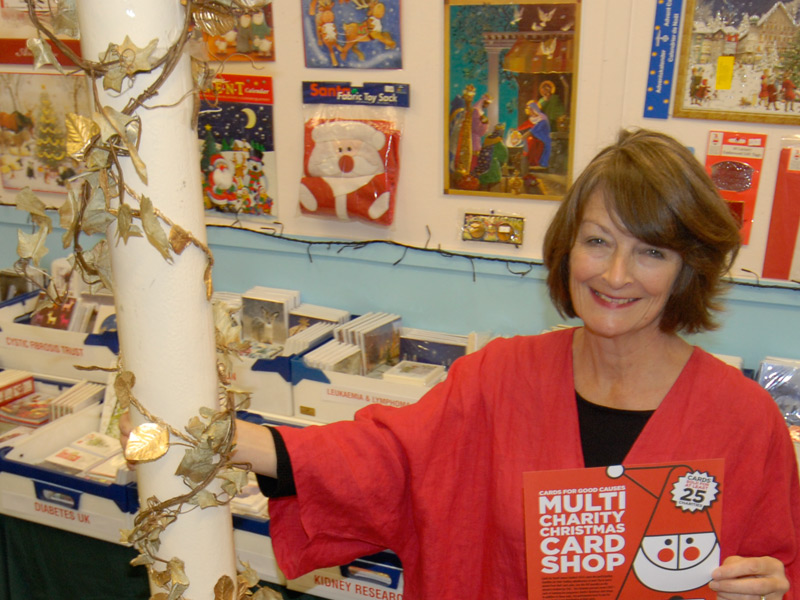Once again there is no mistaking the most popular local charity when it comes to Christmas card sales in Rye. The Romney Marsh Historic Churches Trust sold more cards than practically every other charity at the shop held annually at the Rye Community Centre on Conduit Hill. Only the RNLI and Macmillan Cancer Support, both national charities, sold more.
Making an appearance at the Rye shop for the first time were two other local groups: The Oliver Curd Trust and The Music Well. Both helped meet the continual demand for “something local”.
The Oliver Curd Trust was founded by Richard and Sarah Curd after their elder son Oliver died aged nine from a very rare form of cancer. They determined to offer families with seriously ill children the chance of a short holiday. Two mobile homes are available, fully equipped and entirely free.
The Music Well offers music therapy and activities to those with special health needs, from primary schoolchildren to the elderly. It had just three cards – all familiar views, taken from original watercolours by Andrew Blyth – which were sold individually. The most popular of these was the Lion Street view of St Mary’s Church.
It was not an easy year for selling Christmas cards and the shop struggled to match last year’s total. In fact it missed the target by a few hundred pounds. Higher postage charges do not help the cause of Christmas cards but the cards themselves are amazingly good value. When a single birthday card can cost upwards of £2 it makes a pack of 10 quality Christmas cards a bargain at £3.50. Several of the charities also produce mixed packs where the cost per card can fall to less than 15p.
As for e-cards: anyone admitting to sending them made a hasty departure from the shop! And what is their advantage, other than not having to get out of your chair to send one? E-cards are for the lazy as far I’m concerned. You can’t display them, so no one gets to see them – and does the recipient look more than once?
Grouping so many charity cards in one venue is the biggest advantage. The business began in 1959 when a group of medical charities met to agree tactics for selling cards. The 1959 Group was born and opened its first shops in 1964 in empty premises in town centres. As the business grew it became necessary to separate this trading group and it was named, appropriately, Cards for Good Causes (CfGC).
Last year CfGC ran 317 shops selling cards on behalf of about 30 charities. Although Rye struggled to match last year’s sales, more than 50% of the shops across the country increased their sales and the overall turnover was maintained at £5.7 million.
Each charity selects and provides it own cards – usually about eight designs – and they receive back at least 70p in the pound on every pack sold. As customers will know, several of the more popular charities sell out all together. Christmas goods – wrapping paper, advent calendars/candles and small gifts – are sold by CfGC to help offset the running costs.
None of this would be possible in Rye without the 30-plus volunteers. Some of those volunteers, like two sisters, travel from Mill Corner near Northiam to do their stint. Others from Fairlight or Winchelsea. And they don’t do just one shift but often a regular weekly slot.
The shop in Rye has been running for 20 or so years. When I looked back at the volunteer list from 10 years ago I recognised umpteen names. One told me she’d been selling the cards almost from day one. Long may she and her colleagues continue to do so.
Jane Taylor has managed CfGC shops since 2007. Photo: Tony Nunn



